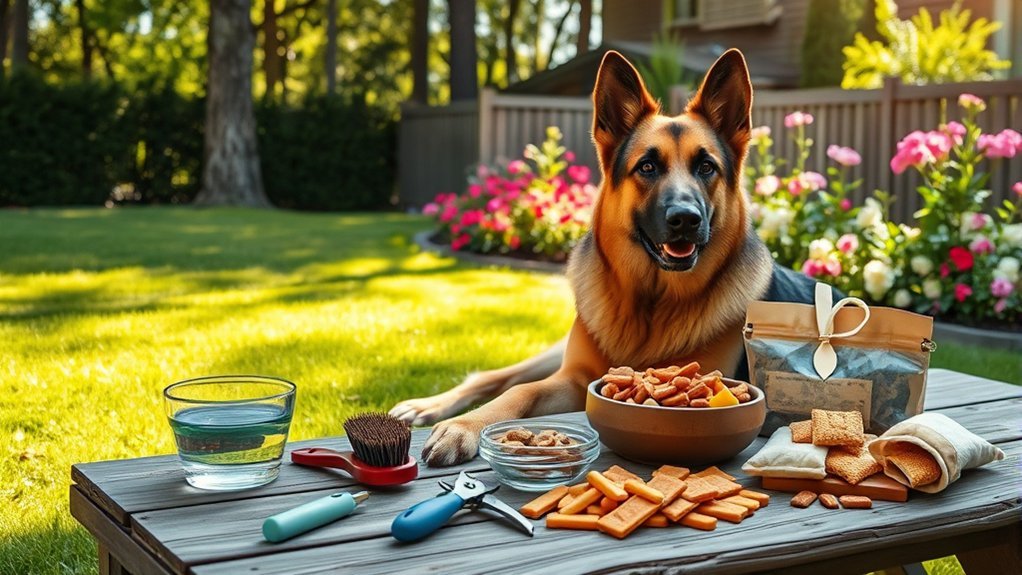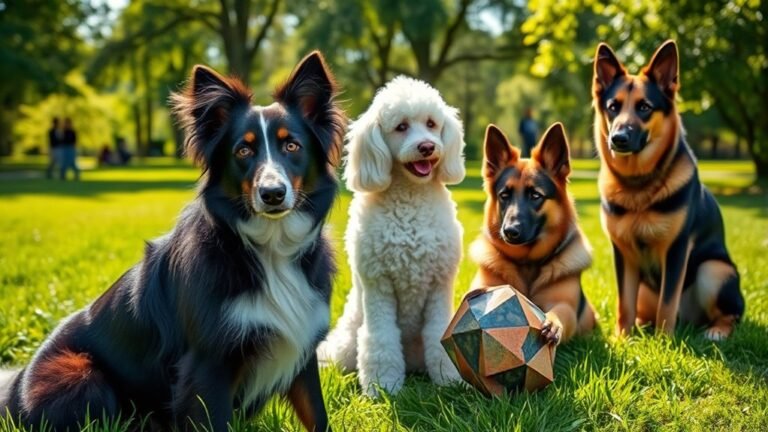Ultimate German Shepherd Care Guide for Every Owner
Caring for a German Shepherd is more than just feeding them and taking them for walks. It means knowing what they need to be happy and healthy. These dogs need good food, training, and grooming. As their owner, it is your job to keep them healthy and safe. Every time you spend with your German Shepherd helps to make your bond stronger. Let’s look at the key parts of taking care of your German Shepherd.
First, focus on their food. German Shepherds need high-quality dog food that gives them all the nutrients they need. Make sure to feed them the right amount based on their age and activity level.
Next, exercise is important. These dogs are active and need daily walks and playtime. Give them plenty of chances to run and play to help them stay fit and happy.
Training is also key. Start with basic commands like sit and stay. You can use fun training games to keep them interested. This helps them learn and also helps you build trust together.
Don’t forget grooming. Brush their fur often to keep it healthy and shiny. Check their ears and teeth regularly to keep them clean, too.
Finally, make sure you have the right supplies. Get a good collar, leash, and toys. These will help you keep your German Shepherd safe and entertained.
By focusing on these key parts of care, you will help your German Shepherd live a long, happy life. Enjoy every moment with your furry friend!
Key Takeaways
- Learn what makes German Shepherds special and know the health issues they might face. This helps you care for your dog better.
- Get the right stuff for your dog, like grooming tools, training gear, and safety items. This shows you’re a responsible owner.
- Feed your dog a healthy diet with good dog food. Change the amount you give based on your dog’s age, weight, and how active they are.
- Use positive training methods to teach your dog good behavior. This helps with any problems before they get too big.
- Take care of older dogs by giving them joint supplements and changing their diet. Spend time playing and bonding as they grow older.
Understanding the German Shepherd Breed
Understanding the German Shepherd breed is important if you’re thinking about getting one as a pet. These dogs are known for being loyal and smart. They make great friends and work dogs. German Shepherds are confident and protective. They were originally herding and working dogs, so these traits come naturally to them.
If you take good care of a German Shepherd, they can live for about 10 to 14 years. However, you should know about some health issues that might affect them. There are different types of German Shepherds, like working line and show line, which can fit various lifestyles and needs.
These dogs need a lot of exercise and training. This helps them behave well and keeps them happy. They also follow specific size standards that define the breed.
Essential Supplies for Your German Shepherd
Preparing for a German Shepherd is exciting! To make sure your new furry friend feels safe and loved, gather some essential supplies.
First, get grooming tools like a brush and nail clippers. These will help keep their coat nice and healthy.
Next, think about training tools. A good leash, a comfortable harness, and a training collar will help you teach them.
Don’t forget feeding accessories! A sturdy bowl for food and water is a must so they can eat and drink easily.
Safety is also important. A crate is useful for travel, and reflective gear is great for walking at night.
With these items, you’ll help your German Shepherd feel right at home. You’re laying the groundwork for a strong bond and taking on responsible pet ownership.
Enjoy your new adventure together!
Nutrition and Diet for Optimal Health
To help your German Shepherd stay healthy, it’s important to give them a balanced diet. Choose good-quality dog food that has the right mix of proteins, carbs, and healthy fats.
You might also want to add some supplements, like omega-3 fatty acids, for their joints and coat.
Feed your dog at the same times every day to help them manage their weight. Usually, two meals a day work well for adult German Shepherds.
Make sure to change the portion sizes based on their age, weight, and how much they move.
Watch out for any food allergies or sensitivities your dog might have. If you’re unsure about their diet, ask your vet for advice.
With the right nutrition, your German Shepherd will be a happy and healthy friend.
Training Techniques for German Shepherds
Training your German Shepherd can be fun and rewarding! Start with basic commands like sit, stay, and come. Use treats and praise to encourage good behavior. This helps your dog trust you and makes your bond stronger. Clicker training is a great tool to show your pup what you expect from them.
Once your dog masters the basics, practice leash walking. This helps your dog learn focus and discipline. For an extra fun challenge, try agility training. It helps keep your dog fit and active while stimulating their mind.
If your dog has any behavior issues, work on those with patience and consistency. Scent detection training can also be a fun way to keep your dog sharp. It encourages problem-solving and uses their natural instincts.
Socialization and Interaction Tips
Socializing your German Shepherd is very important. It helps them grow up friendly and well-behaved. To help them learn how to get along with other dogs, set up playdates. This allows them to have fun and understand good behavior.
Joining training classes is also a great idea. These classes build their confidence and strengthen your bond. Taking them to dog parks lets them meet different people and see new things. This makes them more adaptable.
Make sure to involve your family too. Let your German Shepherd spend time with everyone at home. Visiting community events will help them meet new faces and have fun.
You can also include obedience training in your daily routine. Use positive reinforcement, which builds trust and encourages good manners.
Exercise Requirements and Activities
Your German Shepherd needs exercise to stay happy and healthy. Aim for at least an hour each day. You can do this by jogging, playing fetch, or engaging in fun games.
Going on hikes is a great way to keep them active while exploring with their sharp senses.
Agility training is another awesome choice. It helps your dog gain strength and improve their skills. Plus, you’ll strengthen your bond as you work through obstacle courses together.
Make sure to be consistent with their exercise routine. This will help stop bad behaviors and keep your furry friend happy.
Enjoy these activities with your German Shepherd, and you’ll see them thrive!
Grooming and Coat Care
To keep your German Shepherd looking great, regular grooming is very important. Their coat needs care to stay healthy and shiny.
Brush their fur at least twice a week. This helps cut down on shedding and stops mats from forming. During shedding season, try to brush them every day.
You should also bathe your dog, but don’t do it too often. Every couple of months works well, or whenever they get dirty. Use a gentle dog shampoo for this.
Don’t forget to check their ears and nails too. These areas need care to keep your dog comfy.
Grooming helps your German Shepherd look good and shows them you love and care for them!
Common Health Issues to Watch For
German Shepherds are usually healthy dogs, but they can have some health problems. It’s important to keep an eye on a few things.
First, hip dysplasia can be a big issue for this breed. Make sure you take steps to prevent it. Also, watch for skin allergies. If your dog is scratching a lot or has any irritation, pay attention to those signs.
Obesity is another risk. Keep your dog’s diet balanced to help them stay fit and healthy. Dental care is important too. Regularly brush your dog’s teeth to avoid dental problems.
Be aware of heart conditions. If your dog seems tired or lazy, talk to the vet. Keep an eye out for ear infections too. If your dog is scratching their ears or if there’s a bad smell, check with your vet.
Bloat is a serious issue that can be life-threatening. Learn the signs so you can act quickly.
Finally, support your dog’s joints with the right exercise and maybe some supplements to keep them happy and active.
Monthly Health Check and Veterinary Visits
Regular health checks and veterinary visits are important for your German Shepherd. These appointments help keep your dog healthy and happy.
By sticking to a routine, you can make sure your pup stays in good shape. Here are some things to check during your monthly visits:
- Look at their vaccination schedule to keep them current.
- Watch for signs of illness, like changes in their eating or behavior.
- Check their skin for ticks or fleas to prevent pests.
- Inspect their teeth for health and any gum problems.
- Weigh them and check their body condition.
Taking these steps can help your German Shepherd live a long and happy life!
Creating a Safe Home Environment
Creating a safe home for your German Shepherd is really important. These dogs love to explore and play.
First, set up safe spaces where they can rest and feel cozy. Make sure these areas have no dangers, like toxic plants or small objects they might swallow.
Pet-proof your home. This means securing any loose electric cords and removing anything they could choke on.
Put cleaning supplies high up where they can’t reach them. Use baby gates to keep them out of some rooms, which helps prevent accidents.
Buy good toys for your German Shepherd. This will keep them busy and help stop them from being destructive.
Remember, your dog can pick up on how you feel. If you create a happy and calm atmosphere, your dog will feel safe and loved.
With your care, your home will be a great place for your German Shepherd to enjoy!
Managing Behavioral Challenges
Even in a loving home, German Shepherds can have behavior problems. These issues often come from their high energy and smart minds.
To help manage these challenges, you can try a few simple strategies:
- Reinforce obedience by training your dog consistently.
- Use behavior techniques that fit your dog’s needs.
- Reduce anxiety by making your home calm.
- Distract your dog during stressful times to keep them calm.
- Manage aggression to stop fear-based reactions.
Knowing what makes your dog stressed helps them behave better with others. This understanding improves their social skills and helps control their impulses, which makes them happy and healthy.
Working through problems with patience builds a stronger bond between you and your German Shepherd.
Traveling With Your German Shepherd
Taking your German Shepherd on a trip can make it even more fun. A road trip can lead to great outdoor experiences.
Just make sure to pick places that welcome dogs. For safety, get a good travel harness and a dog crate. Before you go, find places to stay that allow pets so your dog is comfortable.
Pack the things your dog needs, like food, a leash, a water bowl, and some toys.
Look for parks or hiking spots near where you’re going. This will help your dog have a great time.
With some planning, you can make wonderful memories and have a stronger bond with your furry friend. Enjoy every journey together!
Aging and Senior Care for German Shepherds
As your German Shepherd gets older, they may need a little extra care. It’s important to notice how they change and adjust how you look after them. Here are some easy ways to keep them happy and comfortable:
- Joint care: Give them supplements to help their joints. This can make moving around easier for them.
- Mind health: Play fun games with them. Puzzles and activities will keep their minds sharp and engaged.
- Pain management: Watch for any signs that they might be in pain, like limping or not wanting to play. Talk to your vet if you notice anything unusual.
- Special diet: Change their food to something that fits their needs as they age. Senior dog food has all the nutrients they need to stay healthy.
- Regular vet visits: Take them to the vet regularly. This helps catch any health problems early on, so your pup can stay happy and strong.
Taking these steps can help your German Shepherd live a longer, happier life as they age.
Building a Strong Owner-Dog Bond
As your German Shepherd gets older, it’s important to understand their needs. This helps them stay healthy and makes your bond stronger. Spending time together by taking regular walks or playing games is a great way to build trust and keep your dog happy.
You can also do trust exercises. Teaching your dog new tricks is fun and helps you connect. Another idea is to let your dog lead the way on walks. This shows them that you trust them too!
Mix in some training with play, as it helps you both understand and respect each other better.
Watch your dog’s body language. If they seem happy, that’s a good sign! Responding to their needs shows that you’re a caring partner.
The more time and love you give, the more your German Shepherd will feel secure and loved. With patience, you can create a strong bond that lasts a lifetime!
Frequently Asked Questions
How Do I Introduce a New German Shepherd to My Other Pets?
Introduce your new German Shepherd to your other pets slowly. Watch how both pets act during the first meetings. Keep the environment calm and stay with them while they interact. Give praise and treats for good behavior. Let them take their time getting used to each other. This way, they can feel safe and start to connect.
What Should I Do if My German Shepherd Is Afraid of Loud Noises?
If your German Shepherd is scared of loud noises, you can help them feel better. Start by using noise desensitization methods.
Make a calm space for your dog. Play soft music, use nice scents, and create cozy spots for them to relax. This safe area can help your dog feel secure as they slowly get used to the sounds. With patience and time, your dog can learn to be less afraid of loud noises.
How Can I Tell if My German Shepherd Is Happy?
You can tell if your German Shepherd is happy by watching their body language. Look for bouncy movements, a relaxed posture, and a wagging tail. If they play with toys or try to get you to join in, that shows they are joyful and content. These signs mean your dog feels good and enjoys being with you.
Are There Any Specific Toys Best Suited for German Shepherds?
When picking toys for your German Shepherd, think about interactive toys and strong fetch balls. These toys keep your dog smart and active. They will have a lot of fun playing, and it helps you bond with your furry friend. Keep your German Shepherd happy and moving!
What Can I Do to Prevent Separation Anxiety in My German Shepherd?
To help your German Shepherd avoid separation anxiety, start crate training when they are young. A crate can be a safe and cozy space for your dog. Make it a happy place by adding a favorite blanket or toy. These comfort objects can help your dog feel safe when you leave the house.
Spending time with your dog before you go can also help. Play with them or take them for a walk. This creates happy moments before you leave, making it easier for them. Remember to leave quietly and calmly. This helps your dog understand that you will come back. With time and patience, your dog will feel more secure when they are alone.






